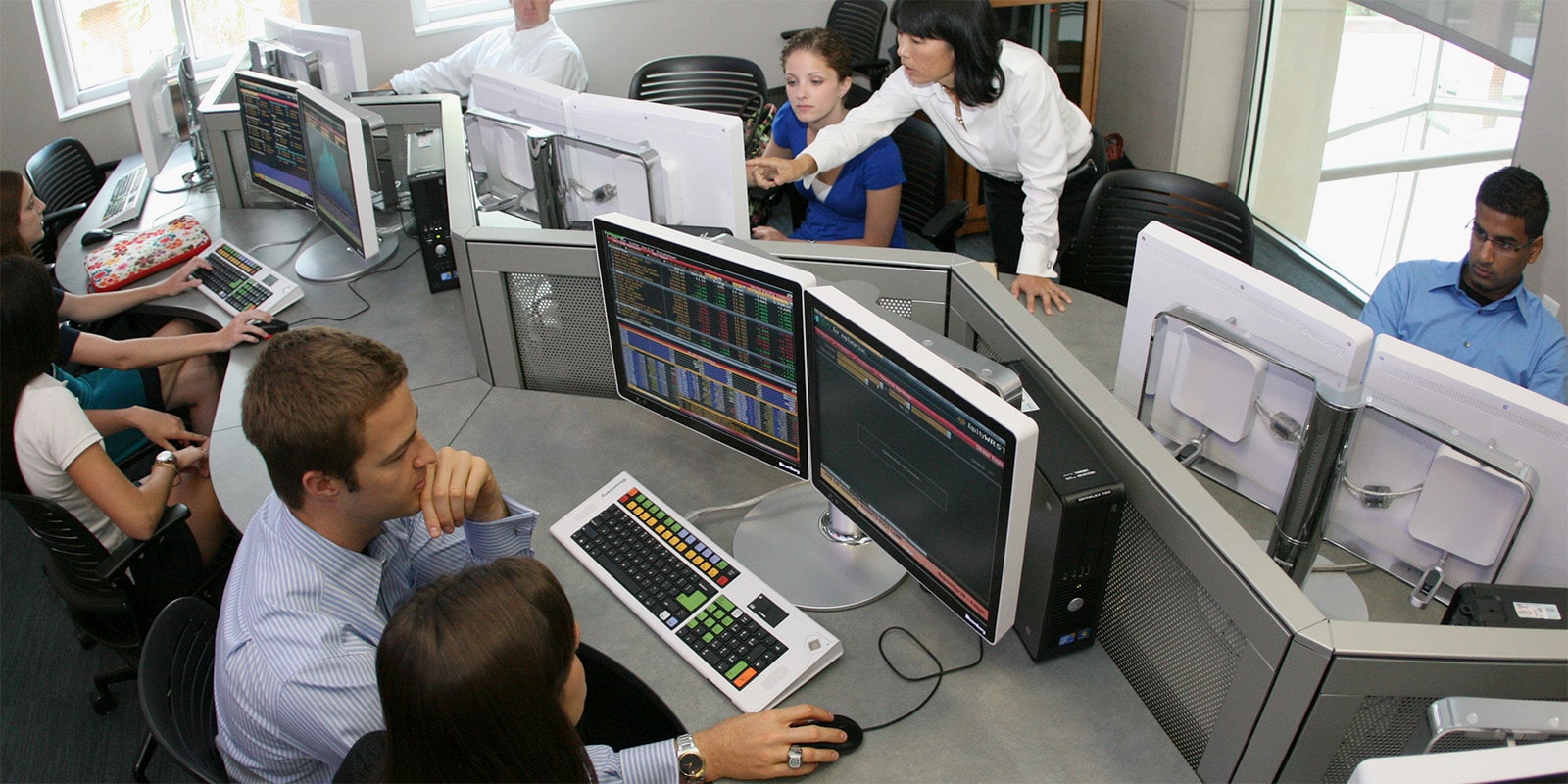
Behavioral Research Lab
Analyze human behavior in discipline-defining facilities
Factors from packaging and displays to thought processes drive consumer decisions.
You’ll be able to clearly understand why and how in the Behavioral Research Lab, one of the nation’s best-equipped and most productive centers for this multidisciplinary field.
About the Behavioral Research Lab
The University of Florida Warrington College of Business’ Marketing Department oversees the Behavioral Research Lab. Here, equipment for observing human reactions and systems for analyzing data support our prolific output, including not only faculty scholarship but also studies orchestrated by our Ph.D. and DBA students.

Capabilities
The hybrid quantitative-qualitative scope of behavioral science is present across our lab. Equipment accommodates face-to-face observations, while software and servers allow you to conduct complex online multimedia experiments and assess large data sets — both in person and remotely.

Structuring your study
CB-Central, our state-of-the-art scheduling website, lets you post studies and define parameters for research design and your pool of participants.

Our research
Behind our department’s cutting-edge studies, the Behavioral Research Lab has expanded what the business world knows about consumer autonomy and decision making, forecasting, market research and external influences on purchasing choices. These results help marketing professionals design products, services, and experiences that engage audiences and deliver a desired response.

Doctoral candidates
Warrington immerses all doctoral candidates in the world of research. Those pursuing topics related to behavioral science — which integrates psychology, economics, sociology, and neuroscience to better understand the influence of outside stimuli and cognitive processes on human behavior — will practice structuring studies and examining their results right here.

Training
Our lab’s training and classes ensure researchers of all levels get up to speed on the systems used to program and conduct behavioral experiments.

Resources
Do you have a question or need a refresher on the lab’s equipment and software? In CB-Central, search our department’s online discussion forums or browse our tutorial repository for your answer.

Equipment and software
Influential and repeatable findings begin with a controlled group and a defined structure for testing your hypothesis. The Behavioral Research Lab aids all stages for face-to-face and online experiments: post your project, require everyone to match your guidelines and track and administer your study throughout its duration.
Discover everything available to you and how our facilities promote the depth and accuracy of your inquiry
The lab
The Behavioral Research Lab consists of 24 carrels for collecting individual data, each with a PC and a 15-inch flatscreen monitor. An experimenter station is positioned on a riser at the back of the room.
Carrels
The carrels are large enough for pencil-and-paper surveys and arrays of physical stimulus materials. Noise-dampening construction helps minimize cross-participant interference.
Experimenter station
Experimenters can remotely view and control each participant’s workstation using SMART Technologies SynchronEyes. During sessions, you can lock the stations pending instructions, block access to the internet and particular programs and communicate with individual participants.
File storage
Each computer is connected by MS Active Directory to a dedicated file server from which all studies are run. This design ensures that all programs and data files are stored in a central location using a RAID array for redundancy.
Running study programs
Launch study programs with LaunchPad, a program specifically designed to randomize and monitor experiments in a lab environment.
CB-Central
Researchers manage all aspects of their experiments through CB-Central, including posting sessions and assigning participation credit. Participants can also sign up for sessions and manage their credits through the interface.
Why we use CB-Central
Unlike other third-party session management solutions, CB-Central allows researchers to enforce arbitrary rules at experiment and individual participant levels. For example, a participant may only sign up for study 3500 if they have completed 3400, but not if they have already done 3600.
For your study
CB-Central allows researchers to pre-screen subjects based on results from an earlier study without the participants’ awareness of this relationship.
Try out CB-Central
To experience CB-Central for yourself, log in as “guest.” Note that depending on the time of the semester, there may not be any studies active or available.
WebLab
WebLab is a system for collecting behavioral data over the internet. It is designed to run a variety of online experiments (e.g., scripting languages, HTML forms, etc.) and is especially good at running Authorware experiments.
How WebLab works
WebLab has an independent interface for posting and administering studies. It also integrates with CB-Central to display active web studies and award participation credit.
Why we use WebLab
The WebLab system allows participants to answer questions or complete a requested task at a time and place of their choosing. It also enables experimenters to collect data from specific online samples and limit the time spent in the behavioral lab.

Programming environment
Typically, our computer-based research is written using Macromedia Authorware, a multimedia computer-based training authoring package. To make the experiment authoring process easier, we have developed an Authorware “wrapper” program called LabShell.
Creating your experiment
LabShell controls all aspects of interfacing with the control station, the file server and WebLab. Using LabShell, researchers simply need to create their experiment locally and then embed it in LabShell. Their study can then be run in the lab, over WebLab, or both.
Data collection and extraction
To mine and collate data across participant log files, we use Perl, an open-source, cross-platform scripting language for data extraction and reporting.

Have questions?
Marketing Department
Stuzin Hall 267
1454 Union Rd
352-392-0161